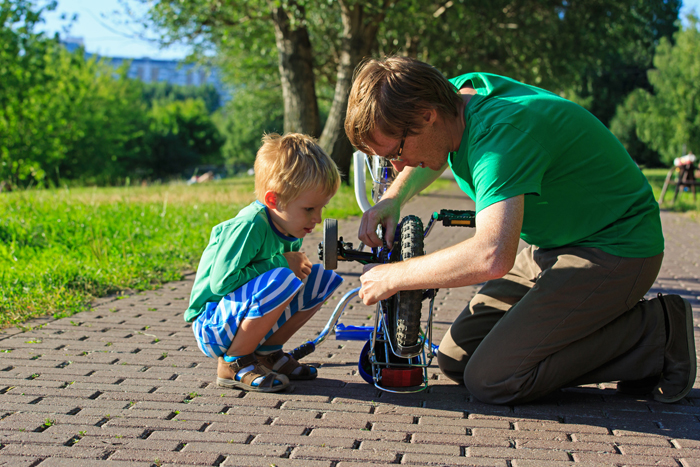
Dads toss their kiddos in the air, they roughhouse, and they're always game for a water-balloon fight.
Those may be stereotypes about Daddy's brand of parenting, but they have some basis in reality, at least according to research. Thousands of studies have found differences, on average, in how dads and moms parent. And increasingly, research shows that Dad's special parenting style may provide unique benefits.
That doesn't mean mothers aren't extremely important, but rather that having two primary caregivers, regardless of their gender, can open up children to more ways of experiencing the world, said Jeremy Schneider, a family therapist in New York City and the author of the e-book "Hey Dads … You Matter!"
From their willingness to tickle-fight to their grown-up speech, here are several ways dads parent differently from moms. [Father Knows Best: The 12 Most Doting Dads]
Manly talk
"Wat a widdle cutie wootie! Whose my widdle baybee?" may be words that would rarely come out of a Dad's mouth: Men don't typically baby talk, according to a study presented in May at the meeting of the Acoustical Society of America.
Men use less of the slow, singsong speech known as "motherese," instead talking to their little ones more like they would to other adults, the study researchers found.
Get the world’s most fascinating discoveries delivered straight to your inbox.
That may be a good thing. While motherese helps babies develop their language skills, fathers may act as a bridge between the tiny world of a child and the wider world he or she will eventually enter, said lead author of the study, Mark VanDam, a professor in the speech and hearing sciences department at Washington State University.
"We think that maybe fathers are doing things that are conducive to their children's learning, but in a different way. The parents are complementary to their children's language learning," VanDam said in a statement.
Compared with moms, on average, dads tend to issue more commands and do less describing, and they also tend to ask more what, where and who questions to their toddlers. All those w-questions mean tots talk more, use a wider range of vocabulary and produce longer phrases when with Daddy, according to a 2004 study in the journal Social Development.
Physical play
Though moms spend more time with their kids overall, dads are likelier to break out the tea set, train tracks or water guns and engage in active play with their kids, dozens of studies suggest.
Researchers reporting in a 2006 issue of the journal Gender & Society analyzed time use by both mothers and fathers, finding that women tended to multitask — for instance cooking dinner while comforting a crying child — while dads were likelier to focus solely on their little ones. In part, that may be because women are doing the lion's share of the drudgery, such as diaper duty and toilet scrubbing. But, regardless, men spent more of their kid time playing, talking, and engaging in educational and recreational activities, the study found. [The Top 5 Benefits of Play]
When they do play, dads tend to gravitate toward the adventurous or unpredictable, studies have found.
Dads seem to tolerate the minor boo-boos associated with risky play, allowing their charges to get a few scratches and bruises but safeguarding kids from major harm, according to a 2011 study in the Journal of Developmental & Behavioral Pediatrics.
Fathers in general "tend to be a little bit more lax with limits outside," Schneider said. "They're a little bit more willing to see their children take risks and possibly fail."
Dads are also likely to be the resident experts at wrestling and play-fighting, experts have found.
"As long as there is the caveat that these are generalizations, a lot of dads have a special strength in physical play, rough-and-tumble play," Larry Cohen, a psychologist in Boston and author of "Playful Parenting" (Ballantine Books, 2002), previously told Live Science.
When parents roughhouse with their kids, the bonding chemical oxytocin is released, Cohen said.
Perhaps because they're more comfortable with aggression overall, dads seem to be less ruffled by their children's aggression. Fathers are less upset by the hitting, biting and temper tantrums that are inevitable during the toddler years, according to the book "Fatherneed: Why Father Care Is As Essential As Mother Care for Your Child," (Harmony, 2001).
Preparing for the real world
When disciplining their kids, dads emphasize the real-world consequences of naughty behavior, rather than the relationship rifts that moms might highlight, according to "Fatherneed." Fathers also tend to let their kids struggle longer and get more frustrated before stepping in, Schneider said.
All these little tendencies add up to a big difference for kids as they enter the world. The children of involved dads tend to have higher IQs by age 3, according to a 1995 study in the Journal of the American Academy of Child and Adolescent Psychiatry. Kids with involved fathers also tend to be happier overall with life, more tolerant of stress and, later on, experience less depression, anxiety, fear and guilt, according to dozens of studies.
"Children of involved fathers tend to do better at school, tend to be more social and more comfortable in social situations," Schneider told Live Science.
Daughters with involved dads at home start menstruating later, and are less likely to be teen moms, Schneider added.
But all of these benefits hinge on a father being actively involved in a kid's life, as the child perceives it — and Dad doesn't get to make the call on that, Schneider said.
"There isn't a magic number of hours of involvement. It is how [your children] perceive you," Schneider said. "It is a completely subjective experience. But if children feel their fathers are involved, they tend to experience these benefits."
Follow Tia Ghose on Twitter and Google+. Follow Live Science @livescience, Facebook & Google+. Original article on Live Science.

Tia is the editor-in-chief (premium) and was formerly managing editor and senior writer for Live Science. Her work has appeared in Scientific American, Wired.com, Science News and other outlets. She holds a master's degree in bioengineering from the University of Washington, a graduate certificate in science writing from UC Santa Cruz and a bachelor's degree in mechanical engineering from the University of Texas at Austin. Tia was part of a team at the Milwaukee Journal Sentinel that published the Empty Cradles series on preterm births, which won multiple awards, including the 2012 Casey Medal for Meritorious Journalism.


